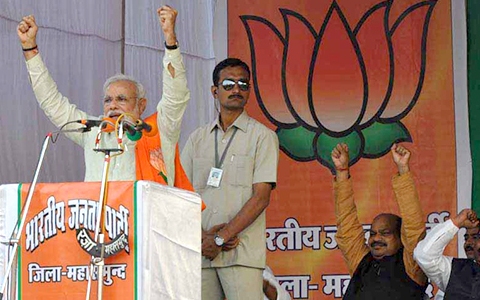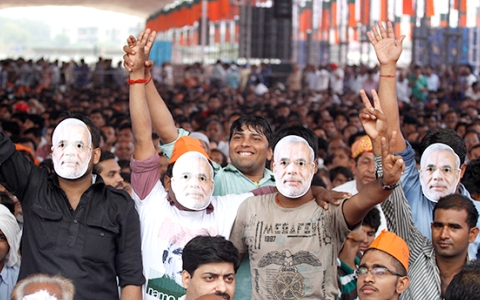Indian election: Victory for Hindu Nationalism means anxious times ahead for Nepal
by - 7th May 2014

ON MAY 16 a winner will emerge from India’s general election after five weeks of voting by the world’s largest electorate.
Opinion polls are pointing to Narendra Modi, leader of the Bharatiya Janata Party (BJP).
But there is growing concern for his flavour of Hindu nationalism - not just in his country but from India’s South Asian neighbour, Nepal.
Across its shared 1580km open border, the Hindu majority in Nepal remain anxious to see how a new Indian government will influence its second attempt to draft a constitution since the overthrow of the monarchy in 2008.
Pro-Hindu party leaders have been making bold statements ahead of the election.
Hindu state
In March, Kamal Thapa, the Chairman of the Rastriya Prajatantra Party (RPP), Nepal’s major pro-Hindu party stated: ‘Narendra Modi wants Nepal to be a Hindu state.’
In April, Ashok Singhal, leader of the Vishwa Hindu Parishad (VHP), a right wing Hindu organisation, announced: ‘The day Modi comes to power in India, I declare that Nepal will turn into a Hindu state’.

BJP’s senior leaders have expressed concerns about Nepal losing its Hindu identity under secularism, but they have not yet gone as far as committing to re-convert Nepal into a Hindu state, emphasising instead the religious and cultural bond between the two countries.
Ravi Shankar Prasad, BJP’s deputy leader, said on a visit to Nepal in 2013 that the cultural bond between Nepal and India was immutable, profound and beyond party lines, and the BJP respects Nepal’s sovereignty and integrity.
Yet Singhal’s assertion of turning Nepal back into a Hindu country is not without credibility. Even with a secular government in New Delhi these last five years, a new brand of Hindu nationalism has been gathering force in Nepal.
Hindutva
It draws heavily on the concept of Hindutva – a cultural nationalism that promotes India’s Hindu, rather than multi-religious, history and identity.
After Nepal was declared a secular state in January 2007, organisations in Nepal like the Hindu Swayamsevak Sangh (HSS) who promote Hindutva have gathered more support, rallying disorganised Hindus under the banner of ‘Hindu unity’ to create a strong lobby and a collective voting bloc.
Hindu nationalism, however, is not new to Nepal. The monarchy used it to instil its version of Nepali nationalism based on one language, one dress, one religion and one nation.
The overthrow of the monarchy created space for a new variant of Hindu nationalism that looks towards India for intellectual and logistical support.
This new Hindu nationalism derives legitimacy by creating a dichotomy between Nepal’s ‘true’ Hindu identity and the constructed ‘others’, pointing to the rapid growth in the number of Christians and Muslims as evidence of Nepal losing its Hindu identity.
Manifesto
When BJP lost the 2009 Indian general election it was a blow to its Hindutva ideology. But the Hindutva rhetoric for 2014 has been crafted to appear more inclusive, whilst avoiding contentious issues.
It’s manifesto focuses exclusively on policy issues, yet cultural issues, seen as divisive, are squeezed into single sentence paragraphs in final pages. The Ram Mandir issue, a major platform for the BJP since the 1990s, is summed up simply as: ‘BJP reiterates its stand to explore all possibilities within the framework of the constitution to facilitate the construction of the Ram Temple in Ayodhya.’
But transplanting the idea of Hindutva, as understood in India, to Nepal looks to be problematic.
In India Hindutva is about patriotism towards India and the political class in Nepal – mostly Hindu caste elites - is not too comfortable accepting it.
Their older, self-assured, Hindu nationalism is quickly disappearing and the new brand of suspicious Hindu nationalism looks set to provide the guidance. It is a new, aggressive, and disturbing trend in an unreliable secular democracy.
Without an intellectual foundation based on the historical and social ethos of Nepal it will continue to look towards India for intellectual guidance. BJP’s rise will only embolden them.
